The article below is a great example of a traveller's account. It's about Berlin and its beer-drinking establishments. Amongst other things, it demonstrates the central role of beer in German society.
"BERLIN BEERSHOPS.
The Emperor Wilhelm 1, spite of the machinations, real and assumed, of the German Socialist party, is as popular a monarch as any in christendom ; but the sovereign whose image is most deeply enshrined in the hearts of the German people is Gambrinus, the titular beer king. Beer is an institution so peculiarly and thoroughly Germanic that the whole land seems to flow with the foaming beverage-amber, pale-yellow, brown, or the creamy "weiss." The Germans attribute singular virtues to the beer they drink, and have a favourite proverb which says that "He who does not become handsome before twenty years of age, strong before thirty, wise before forty, and rich before fifty, on such a man malt and hops are lost." In Germany beer is drunk by all classes of the community. The trades man and working man bring their entire family with them to the beer-garden to sip the national beverage; the lover of modest social rank drinks his beer in public beside his betrothed ; the student celebrates every possible triumph, enjoyment, and event in beer; the great people refresh themselves with it in their gilded saloons ; theological and legislative assemblies find inspiration and invigoration from the stimulant ; and even the aged Emperor seeks new energy in his favourite beer of Töplitz. Strangers in the German capital are commonly struck by the apparent absence of any equivalent to the London public-house and Paris merchand de vins ; but they soon discover that in addition to the ample provision for drinking at all places of public entertainment, and the numerous so-called cafes, where beer is almost the only beverage consumed, there are any number of shady beer-gardens in the heart of the city, screened by the fronts of the houses; and that, moreover, the basement of every tenth house is a Bier-Lokal or drinking-place of some kind.
Two typical institutions of the German capital are its weissbier and wein stuben, both usually to be met For the with in the quieter streets and frequented by regular rather than by chance customers. The Berliner of the old type is usually a weissbier drinker, who regards the beverage as peculiar to the city, and is fond of expatiating upon its merits to strangers. You no sooner become acquainted with a man of this class than he will ask your opinion of the "weiss." I remember being sorely puzzled by an inquiry of the kind end on replying hesitatingly, "The weiss? What is the weiss?" my friend said in a reproachful tone, "What ! have you been among us a whole week and not tasted the weiss yet ?" and then hurried me along until we reached a building with "Weiss-bier Ausschank" painted in huge black letters on the facade. Here we found ourselves in front of a small counter, behind which three individuals were engaged in uncorking stone bottles and carefully pouring their contents into huge glasses, each holding more than half a gallon ; while a fourth was removing kippered lampreys from a barrel. Right and left lay the weissbierstuben, decorated, like all the beer-saloons of Berlin, with plaster busts of the Emperor, the Crown Prince, and Furst von Bismarck. All the little tables crowding both apartments were occupied by guests whose rosy faces and rotund forms attested a familiarity with the good things of this life. Before every one stood a gigantic tumbler, containing a liquid, pale and clear as Rhine wine, and surmounted by a huge crown of froth. This was the famous "weiss". The liquor being ordered and duly brought, we observed that the quart bottle filled not more than one-third of the large glass, the voluminous head of froth not only occupying the remaining space but foaming over the sides. Hence the necessity for such capacious tumblers, which a novice is only able to raise to his lips by the aid of both hands. Not so however, the experienced weissbier-drinker, who by long practice has acquired the knack of balancing, as it were, the bottom of the glass on his outstretched little finger, while he graspsthe side with the remaining fingers and thumb of the same hand. A preliminary nip of kummel (aniseed) is considered de rigueur, and, this disposed of, the Berliner will drink his four quarts of "kuhle blonde" as weissbier is poetically termed by its admirers - as readily as his native sand sucks in a summer shower ; exciting his thirst perhaps once in the course of the operation by some salted delicacy such as a lamprey. Berlin is the city where the "kuhle blonde" is obtained in the greatest perfection. It should be drunk when it is of a certain age, be largely impregnated with carbonic acid gas, and should have acquired a peculiar sharp, dry, and by no means disagreable flavour. To the ordinary unstrung Berliner a moderate quantity of the weiss is as soda and brandy to the "seedy" Englishman. After an evening of excess, his steps invariably tend to the wiessbiersube, there to quench his thirst with a draught of kuhle blonde, and stimulate his pallid appetite with knoblauchwurst, a delicacy of the favourite sausage type fried with garlic. The close atmosphere of these places lulls the mind to somnolence; a loud word is seldom heard, and still more rarely a lively conversation. The guests seem to labour under the idea that they might be charged for any noise they made, as well as for the liquor they consumed, as used to be the custom of old in Dutch taverns. After the performances at the theatres are over, the better class beer rooms in the Linden around the Schauspielhaus become the resort of respectable families, ladies not unfrequently visiting them in evening dress with their friends. By the time they retired there will most likely rush into the room of parties young men, fresh from some evening party, heated with discussion, and bent upon moistening their parched throats with a draught of cool lager-beer. The streets of Berlin have been compared in winter time to the navigable waters of the North Sea, since the traveller sees with difficulty through the darkness of the night and the thick veil of fog a few lighthouses casting a red light which serves to point the harbours of refuge. It is the Café Schultze or Café Muller that thus announces its existence ; for though there are only the one or two actual cafés at Berlin, no end of bierstuben assume the designation, The atmosphere within, thanks to the earthenware stove, is as hot and oppressive as that of the disinfecting room of a Russian quarantine lazaretto, and the tables and chairs are as sticky as the sides of a freshly pitched fishing-boat, In these places it is impossible to breathe without a sense of suffocation, or to sit down with out the risk of adhering to your chair. At Munich an ancient custom still obtains of the burgomasters and town Councillors going annually to the Salvator-Keller in order to test the quality of the beer. The test is a very primitive one. The officials attend in their leathern breeches, and beer having been poured over the wooden benches, the civic dignitaries plump down upon them. While there seated they sing an ancient song, the same that their predecessors have sung for ages, and, in order to subject the beer to a fair test, they sit long enough to sing the song a three times. Then they essay to rise up. If now they find their breeches sticking to the benches the beer is voted good. Having stood this test the beer goes through the formality of being tasted, and then its sale to the public is duly sanctioned.
Among the thousand and one underground drinking establishments of which the German capital can boast, by far the most important is its Rathskeller or Guildhall cellar, running beneath the vast brick building dominated by a lofty square tower in which the Berlin he municipality has installed itself. Imagine the low-vaulted cellars of an edifice about half the size of our Houses of Parliament, filled from morning until midnight with a crowd of more than a thousand persons of various ranks of society, the majority of them eating, smoking, and shouting, and all of them steadily drinking - to promote which latter indulgence a thousand and one thoughts in praise of good liquor, emanating from Bacchanalians of all nations and of all epochs, are blazoned above the arches and upon the walls. Imagine this, and you have some faint idea of the famous Rathskeller, one of the lions of Berlin, which the King himself deigned to visit soon after it had been publicly opened, when he drank to the well-being of the Berlinese from a silver-mounted flagon of foaming ale. All degrees of the middle and working classes frequent the place - from the professional man and well-to-do tradesmen, who bring their wives and daughters with them, down to the dissipated young mechanic, who shares his single plat and mug of beer with the factory girl by whom he is accompanied. The smaller beer-cellars of the capital are legion, and are often the resort of the lowest classes of the community, several among them being recognised places of rendezvous for thieves and sharpers.- Pall Mall Gazettte.
Aberdeen Journal - Wednesday 26 February 1879, page 8.
Straight off I'll say this: that stuff about the Salvator-Keller is almost certainly bollocks. But that doesn't devalue the rest of the article. Because that is the only occasion where the author is not speaking from personal experience.
Let's move on to the positives. What does it tell us about Berliner Weisse? That it came in corked quart stone bottles. That the glasses held double that amount. That it was pale and clear (that's a bit of a surprise). That it was very highly carbonated and had a huge head (hence the oversize glass). That it was aged before sale. That it was dry and acidic. That it was drunk by the older generation. That kümmel schnapps was drunk with it (just like Gose).
That bit about being charged in Dutch pubs for making noise. That can't be true, can it? I've never heard of that. It sounds like the sort of joke that would be cracked about the famously frugal Dutch.
Young men drinking lager? Sounds very modern. Lager is why I found this article, coincidentally. I searched for "Lager beer" in 19th-century Scottish newspapers.
I'm sure that's a huge exaggeration of the size of Berlin Rathaus. Just checked on Google maps. The Houses of Parliament cover more than triple the area of the Rotes Rathaus.
The emphasis the author places on Berlin pubs being frequented by all classes, both men and women, adults and children is significant. Because you wouldn't have found that in Britain in the 1870's. Even if they were drinking in the same pub, the different classes would have been in different rooms. And no respectable middle-class man would have taken his wife and daughters to the pub with him.
Bavaria is still like that. All ages and classes drink in the same beerhalls and beergardens. That's one of the reasons I love it so much.


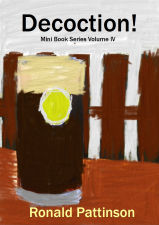













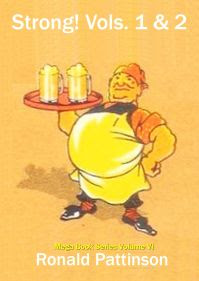


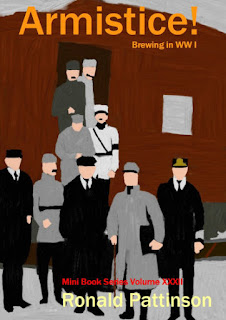
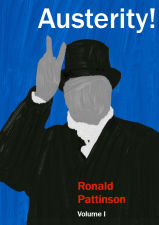







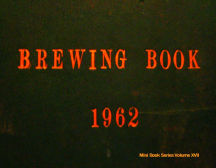
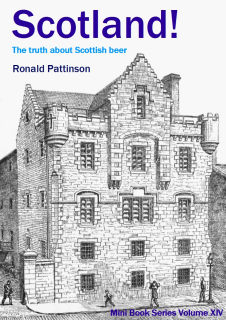
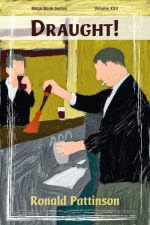

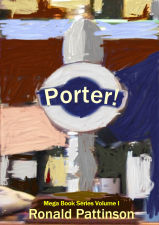

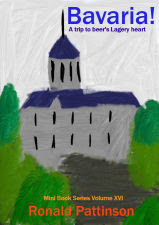

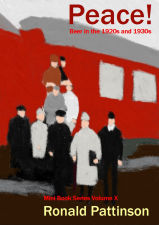

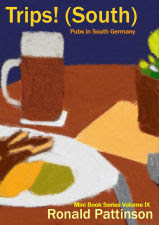
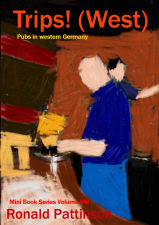
































No comments:
Post a Comment